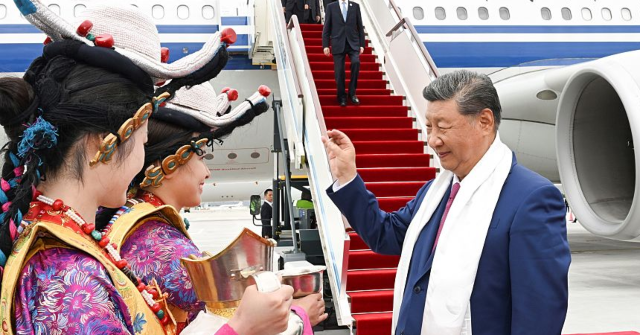Dictator Xi Jinping made a rare visit to Tibet — only his second in over 12 years as ruler of the Chinese Communist empire — to mark the 60th anniversary of China’s conquest of the Himalayan nation on Wednesday.
The day featured a military and police parade festooned with Communist slogans, and dark warnings that “separatism” would be ruthlessly eliminated.
“To govern, stabilize, and develop Tibet, the first thing is to maintain political stability, social stability, ethnic unity, and religious harmony,” Xi declared.
“Video broadcast by the Chinese government showed hundreds of people in traditional dress dancing with flowers and banging traditional drums as Xi walked the red carpet. Thousands more waved flags and white ceremonial Tibetan scarves along Xi’s motorcade route,” Radio Free Asia (RFA) reported.
Xi and other officials gave speeches in front of Potala Palace, which was the residence of Tibet’s spiritual leader, the Dalai Lama, until he fled the country in 1959.
The speeches touted the supposed economic benefits China has brought to what is now known as the “Tibet Autonomous Region,” mixed with belligerent warnings to Tibetans and foreigners alike that Beijing owns Tibet forever and is not interested in criticism for oppressing the Tibetan people.
“Tibetan affairs are China’s internal affairs, and no external forces are permitted to interfere. All schemes to split the motherland and undermine stability in Tibet are doomed to fail,” proclaimed senior Chinese Communist Party official Wang Huning, one of Xi’s top advisers.
Wang summarized the day’s message by claiming that the “great achievements of the Tibet Autonomous Region” during the six decades since its capture could only have occurred under the “leadership of the Communist Party of China.”
“Tibet has entered its best period of development, experiencing the greatest changes and bringing the most tangible benefits to people of all ethnic groups,” he said.
The parade held outside Potala Palace included local music, dance troupes, and floats extolling the beauty of Tibet mixed with intimidating squadrons of Chinese soldiers and police, plus banners emblazoned with Communist Party slogans.
Some observers detected a whiff of anxiety in China’s 60th anniversary celebration of its conquest. Xi’s previous visit to Tibet was only five years ago, which prompted the Dalai Lama’s representative to Washington, Namgyal Choedup, to suggest “everything is not rosy inside Tibet, as Beijing portrays.”
“Despite more than six decades of the CCP’s rule, Tibet is essentially a police state and arguably the most surveilled region in the whole of PRC,” Choedup told RFA.
“Xi’s visit to Lhasa to mark the 60th anniversary of the founding of the Tibet Autonomous Region rings hollow because Beijing lacks both historical and popular legitimacy over its presence in Tibet,” he said.
“I am really struck by the decision for Xi himself to go,” Tibet scholar Robert Barnett of the School of Oriental and African Studies in London told the leftist publication the New York Times (NYT).
Barnett sensed “existential anxiety” in the Chinese Communist Party over “religion and nationality,” despite China’s best efforts to suppress both.
The BBC noted that Xi’s appearance in Tibet was a surprise, and probably not a pleasant sojourn for the 72-year-old dictator, thanks to the high-altitude Himalayan atmosphere.
Xi pointedly avoided mentioning the Dalai Lama, even though the Tibetan Buddhist leader has been in the news lately. The Dalai Lama, who lives in India and recently turned 90, announced in July that he will name his successor — or rather, he will be reincarnated as his successor — instead of giving China authority to determine who will become the leader of his faith.
The Chinese Communist Party claims it has the right to approve the next Dalai Lama. It regards the current holder of the office as a “separatist” who has instigated uprisings against Chinese rule, even though he officially supports a “middle way” of greater autonomy for Tibet instead of outright independence.
The BBC visited a Buddhist monastery located just outside the Tibetan Autonomous Region in July, famous as the place where Tibetans once set themselves on fire to protest the Chinese occupation. Reporters found it was now under constant heavy surveillance. Security agents roamed the halls, cameras were everywhere, and a “police station” had been built on the grounds.
The BBC noted that much of Tibet has been turned into a high-surveillance prison state, its people muzzled by heavy censorship. Xi Jinping chose not to mention the Dalai Lama’s name, while Tibetans are forbidden to speak of him.
In recent months, Chinese officials have kicked Buddhist monks and nuns out of academies, dragged Tibetan children off to “boarding schools” for re-education, imposed Chinese names on parts of Tibet, and kept foreign reporters from observing conditions in the region.
Read the full article here



